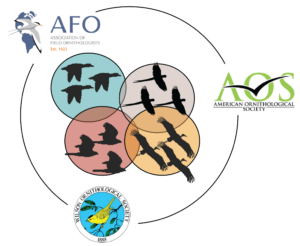
Changes in the sciences over the past few decades have highlighted the need to ensure ornithologists of all backgrounds and circumstances are supported in ways that are equitable, inclusive, and promote a sense of belonging within the field. Professional societies are uniquely positioned to drive this sort of cultural change, and can be facilitators in connecting ornithologists to the professional and personal support they need to succeed. Towards this aim, the Flocks Project (funding through a DESIGN grant from the National Science Foundation’s BIOLEAPS program) has been working closely with the American Ornithological Society (AOS), the Wilson Ornithological Society (WOS), and the Association of Field Ornithologists (AFO) to better understand the experiences of ornithologists in the society and to co-create affinity groups, or Flocks, aimed at serving underrepresented communities in ornithology. Affinity groups are groups of people organized around an identity, topic, or goal and often provide support through community building, providing emotional support, and amplifying the voices of their members. Research shows that affinity groups foster belonging and retention in STEM (science, technology, engineering, and math) professions. The overarching goal of the Flocks Project is to build sustainable, supportive communities in ornithology that contribute to the diversification of the field.
This past spring, the Flocks team surveyed members of the three ornithological societies to better understand members’ experiences in the field of ornithology, and within each society, as well as to gauge overall interest in affinity groups, and what groups they would like to see created. In total, 1,175 members of ornithological societies participated in the survey, with 755 respondents indicating the AOS was their primary ornithological society. We found that 38% of respondents reported that they would benefit from belonging to an affinity group, and that they would feel a stronger sense of belonging within their ornithological society because of membership in an affinity group. This interest was particularly strong amongst those from under-represented groups in ornithology (e.g.,ethnoracial minorities, LGBTQIA+ members, and individuals who identify as neurodivergent or as having a disability). Members expressed strong interest in founding affinity groups based on career stages, ethnic and racial identities, disability and/or neurodivergence, and more. The desired roles and functions of the affinity groups varied by interest. These results are now informing the design of Flocks.
Members that expressed interest in being involved in the process were invited to information sessions and to apply to take part in a series of workshops to design the process for co-creating the initial set of Flocks, and to lay the groundwork for more future Flocks. Flock co-creators have been working together through virtual meetings this summer – getting to know each other and the needs of the ornithological society members. Until then, the team looks forward to continuing to design the Flocks, spending a full day together in October at the AOS meeting, digging in on all of the details of Flocks, how they function, and how they work with societies.
Feedback about the co-creation process has been positive, as participants show strong engagement in the work and a strong sense of community with other co-creators and the Flocks team. One co-creator stated the following,
“It is an inclusive space… in some cases we feel disoriented in the field of ornithology as new researchers, however, these spaces encourage us to improve our skills and to think that we will be part of the change…The planning seems very successful to me, and I hope to continue being inspired by great ornithologists like those on the team.”
–Sergio Andres Mendivil Rivas
The process’s focus on inclusivity is not only reflected in the diversity of co-creators, but in the provision of interpreters, use of closed captioning, and implementation of interactive gatherings that allow for co-creators to provide feedback and engage with the team.
Learn more
At this year’s AOS annual meeting at Estes Park we will be hosting a roundtable session to talk more about the project—our aims, findings, and co-creation process. The roundtable session will take place Thursday, October 3, from 12:00 to 1:00 p.m. MT in the Giant Track room. Please join us to learn more about the project and provide feedback. For anyone not able to attend the session at the annual meeting, we will be holding a webinar on Wednesday, October 23, from 1:00–2:30 p.m. ET.
Connect with us
For more questions about the Flocks Project, email the AOS Diversity & Inclusion Coordinator, Amani Edwards at aedwards@americanornithology.org.
Principal Investigators
Dai Shizuka
University of Nebraska-Lincoln
Ashley Dayer
Virginia Tech
Senior Personnel
Kristen Covino
Loyola Marymount University
Tim O’Connell
Oklahoma State University
Jennifer Smith
University of Texas, San Antonio
Staff
Nathan Thayer
Post Doctoral Researcher
Amani Edwards
AOS D&I Coordinator/Flocks Project Coordinator
Anuradha (Anu) Sen
Evaluator